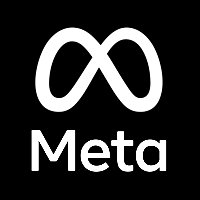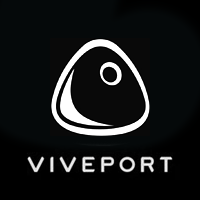NODA Mind Mapping
VR Review ★★★☆☆
PCVR Quest Quest Link Creativity Utilities Comfortable Roomscale Stationary

Coming from an engineering and construction project management background we have an appreciation for the benefits of organization. Mind maps can be useful tool to help collect and organize seemingly disparate pieces of information and bring them under control. They can help greatly both in personal and working environments with note taking, problem solving and creating workflows.
Though mind maps can be developed on paper or on whiteboards, computers are an ideal medium to capture an evolving free-form map that isn't constrained by the borders of a frame or notebook. We were hoping that Virtual Reality mind mapping software Noda might offer the potential to expand this advantage further by adding a third dimension, but in practice this turned out to be more of a disadvantage.
Noda starts well and introduces us to mind mapping in VR with a brief tutorial that teaches us how to create, customize and link nodes together. After this you're on your own, but the clean and intuitive user interface makes it easy to figure most things out. Placing and connecting nodes together is child's play, and we quickly got the hang of changing colors and shapes. The Quest version also includes the option of dragging and dropping images onto the nodes, sourced from either the embedded web browser or an AI image generation tool.
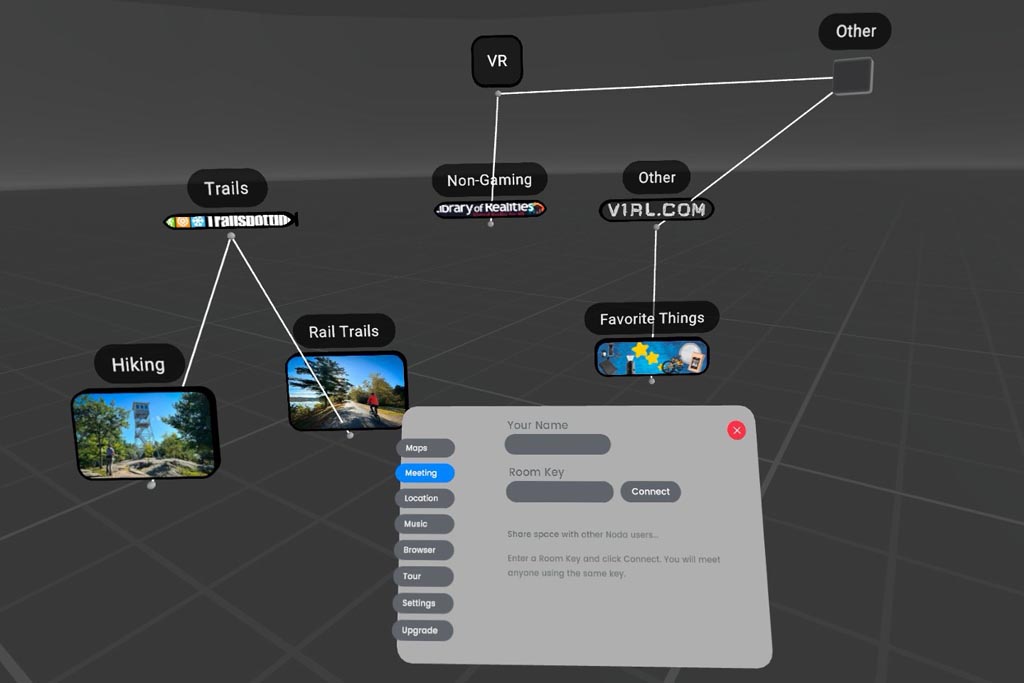
Exploring our websites & topics in a mind map.
As we started to build out a mind map things seemed as usual, but as soon as we began adding depth to our network of items things got confusing fast. It turns out that taking a 2D structure of branching items and allowing them to become a three dimensional webs of connections adds new layers of connectivity that are hard to follow. We quickly reverted back to our usual two-dimensional approach and then wondered the purpose of doing this in VR. Especially when our usual keyboard-and-mouse controls are now replaced with the slower input method VR controller and floating virtual keyboard. It also doesn't help that there is no quick way to view your creations, which can only be done by donning a VR headset or viewing exported unformatted text in a basic CSV format.
Noda also has a somewhat shallow set of features, and doesn't include some functionality that is common to most flatscreen mind mapping computer software. The app is missing standard process workflow graphics and only offers a single basic layout option. We found it difficult to organize and reposition nodes in space as there are no grid-snapping or centering options, and equally frustratingly there's no option for subordinate nodes to reposition when you move a parent node.
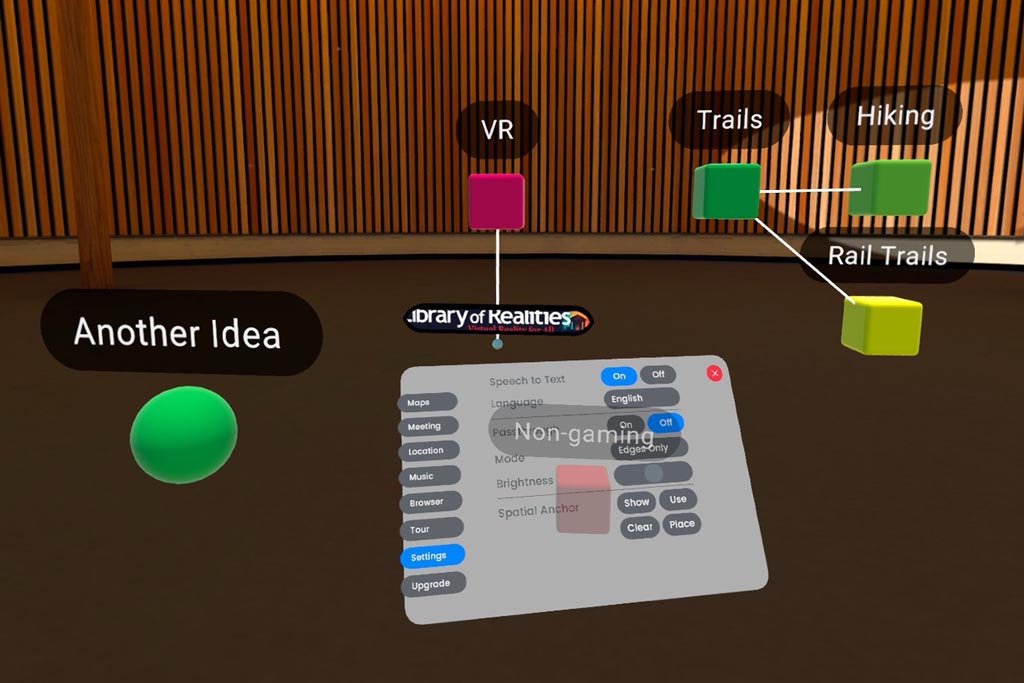
Standard nodes are configurable with shapes and colors.
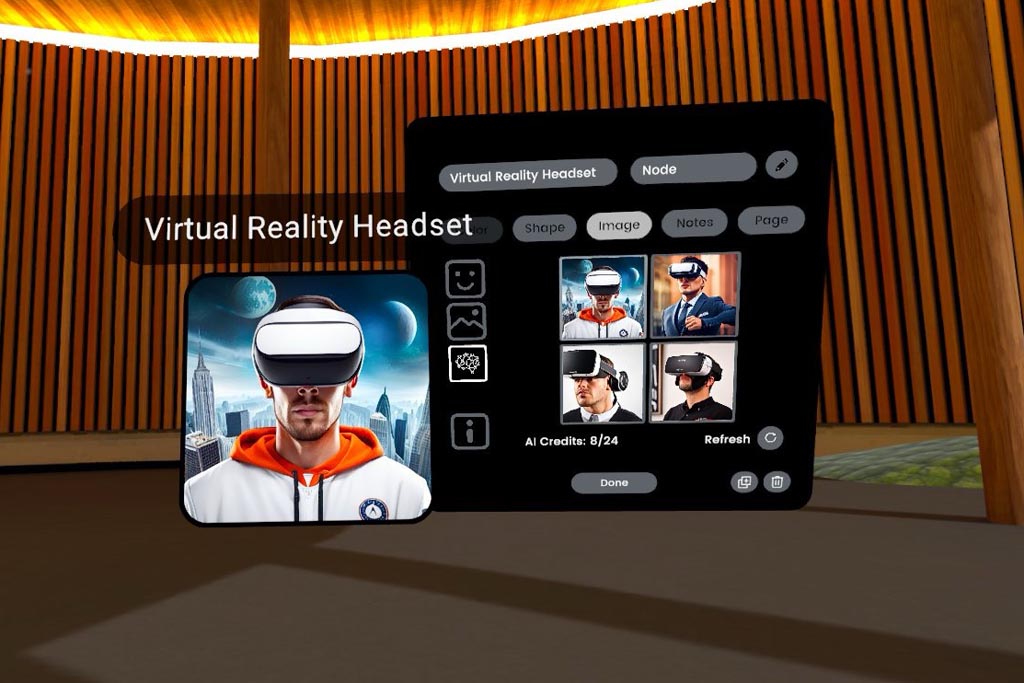
Attach AI generated images to nodes.
We highly recommend checking out mind mapping software to help you with organization in your life and work. Unfortunately for Noda we much prefer to organize our lives on a flatscreen program rather than having to don a VR headset to create and review our planning work.
Noda is available on multiple platforms, but only the Meta Quest version appears to contain all the latest functionality including passthrough mixed reality. The Quest version has a two-tiered price structure that is described in this screenshot. The Steam version was last updated in October 2020. The Viveport version was last updated in 2019, but it is included in the Infinity subscription if you have that. The Oculus Rift version is linked here The status of the PCVR versions is described by the store icons at the foot of this review. Note that all versions of Node have functionally limited free trial that the curious might want to check out; and the full Viveport version is included in the Infinity subscription plan.
Summary:
⬤ Clean and intuitive user interface
⬤ Basic functionality is easy to learn
⬤ Easy to work in Quest's mixed reality environment
⬤ Lacks capabilities found with desktop equivalents
⬤ Harder to view & understand mind maps in 3D
Supported Languages:
Arabic Dutch English French German Italian Japanese Korean Mandarin Portuguese Spanish
External Links:
YouTube:Noda
Product Links:

